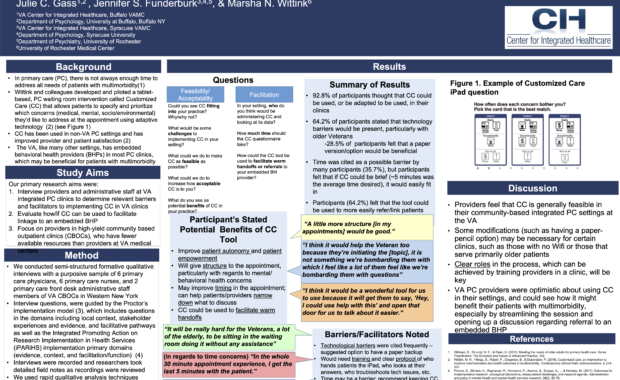Background/rationale: Across the U.S., 20% of cardiothoracic surgery patients discharged to home experience unplanned readmission within 30 days of
I07 – Homeless Services Integrated from Clinic to Shelter to Community
Community programs and healthcare systems are often at-odds with the people who lack housing among us. The systems frequently approach homeless people
A08 – The Oak Street Health Collaborative Care Model: Integrated Behavioral Health in a High Needs, Value Based Primary Care setting
The Oak Street Health (OSH) Care Model is different from traditional healthcare models. OSH is in the fortunate position to invest in interventions to
Poster 43 – Primary Care to Order: Adapting the Customized Care Intervention to VA Integrated Primary Care Settings
For complex patients with multiple competing concerns, the 15-minute primary care appointment can be a challenge - what to prioritize, what to ask,
H08 – Optimizing Our Integrated Care Teams to Meet the Needs of Our Patients with Psychological Distress and Unmet Social Needs
The COVID-19 pandemic continues to highlight racial and socioeconomic inequities that exist in the United States and result in healthcare disparities.
A09 – Lessons Learned: Initiating and Engaging in Conjoint Appointments between Behavioral Health and Medical Providers
For patients with medical and behavioral health comorbidities, a standard primary care visit may not be sufficient to address the multifaceted nature
L05 – Adult ADHD in Primary Care: A Team-Based Clinical Pathway to Assessment and Treatment
Attention Deficit Hyperactivity Disorder (ADHD) is a neurobehavioral disorder that is most seen in children and adolescents. However, recent follow up
C03 – The Waco Guide to Psychopharmacology in Primary Care
The Waco Family Medicine Residency Program, in consultation with faculty of the Massachusetts General Hospital Psychiatry Academy, has created The
Poster 43 – Same Team, Different Diagnosis?: Physician and Behavioral Health Provider Diagnostic Agreement in a General Hospital Setting
The integration of behavioral health providers (BHPs) in general hospital settings is potentially advantageous because hospitalized patients can have

